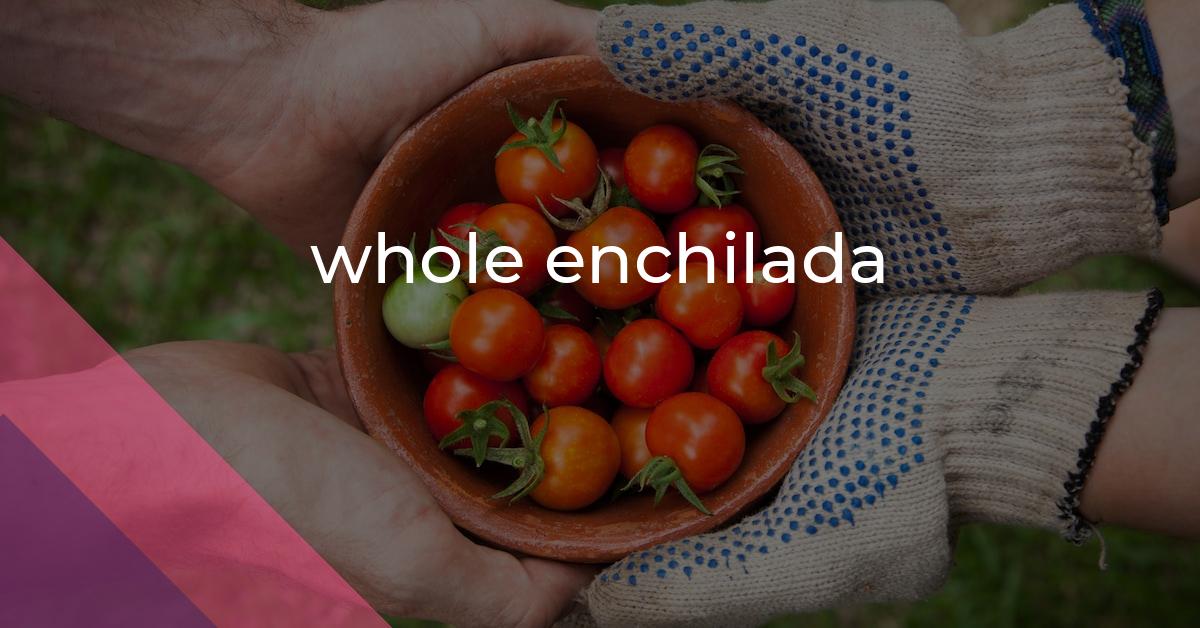whole enchilada: Idiom Meaning and Origin
What does ‘whole enchilada’ mean?
The idiom "whole enchilada" means the entirety or everything of a particular thing or situation.

Idiom Explorer
The idiom "whole shooting match" means the entirety or complete package of something. It implies including every element or aspect related to a particular situation, often used to emphasize that nothing has been left out or excluded.
The idiom "whole shebang" means everything or the entirety of something. It is often used when referring to a complete package, group, or set of things.
The idiom "whole cloth" means to create or invent something entirely new, without any basis or reference to existing facts or evidence.
The idiom "whole ball of wax" means considering or encompassing everything related to a particular situation or topic.
The idiom "warts and all" means to accept or depict someone or something in their entirety, including their flaws and imperfections. It emphasizes the importance of embracing and showing the complete truth, without hiding any unfavorable aspects.
The idiom "say it all" means to fully express or reveal everything, leaving nothing unsaid or unexplained.
The idiom "on the whole" means considering all aspects or generally speaking.
The idiom *one and the same* means that two or more things or people are identical or indistinguishable from each other.
The idiom "one and all" means every single person or thing, without exception.
The idiom "in every sense of the word" means that something is true or accurate in every possible way or aspect. It emphasizes the completeness or thoroughness of a particular statement or description.
Decoding the Enigmatic Phrase
The idiom "whole enchilada" is a popular American expression with its roots in Mexican cuisine. The term "enchilada" refers to a traditional Mexican dish consisting of a rolled tortilla filled with various ingredients, such as meat, cheese, and sauce. This idiom is used metaphorically to describe a situation or thing that includes or encompasses everything, leaving no part incomplete or missing.
One of the related idioms is the "whole shebang," which means the entirety of something. It is often used to emphasize the completeness of a situation or event. Similarly, the idiom "whole shooting match" is another way to express the entirety of something. It originated from the world of shooting matches or competitions, where the phrase was used to refer to the entire event. These idioms can be used interchangeably with "whole enchilada" to convey the idea of completeness.
Another related idiom is the "whole ball of wax." This expression refers to the entirety or entirety of a situation. It is often used to emphasize the all-inclusive nature of something. Similarly, the phrase "as a whole" is another way to express the idea of entirety. It is used to describe something in its entirety, without leaving out any parts or aspects. These idioms can be used alongside "whole enchilada" to highlight completeness and inclusiveness.
Lastly, the idiom "one and all" is another expression related to the concept of entirety. It is used to refer to every single person or thing within a group, emphasizing the inclusivity and completeness of the group as a whole. This idiom can be used alongside "whole enchilada" to emphasize the idea that every part or aspect is accounted for and included.
Overall, the idiom "whole enchilada" is a vivid and relatable expression that effectively conveys the idea of completeness. It has become deeply ingrained in the American English language and is widely recognized and understood. Its origins may be unclear, but its cultural significance and adaptability make it a fascinating idiom within the realm of idiomatic expressions. As English continues to evolve, it will be intriguing to observe the emergence and assimilation of new idiomatic expressions, each adding its own unique flavor to the linguistic landscape.
Example usage
Examples of how the idiom "whole enchilada" can be used in a sentence:
1. After working hard for years, she finally got the promotion and now she is in charge of the whole enchilada.
2. We managed to win the game and secure the championship. It was a tough match, but we gave it our all and came out with the whole enchilada.
3. The company went bankrupt and had to close its doors. They lost the whole enchilada, including their assets and employees.
More "Food" idioms



